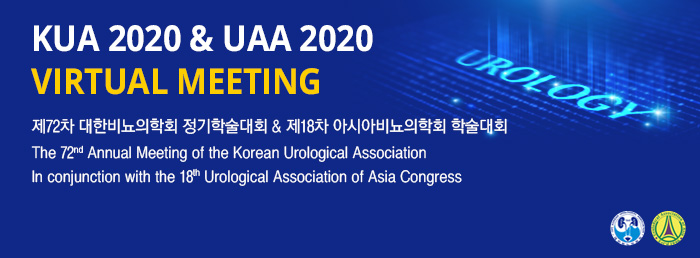|
Cancer - Bladder, Pelvis, Ureter & Others(구연)
|
(E-053)
|
|
|
비뇨기계 종양수술을 받은 환자에서 수술 후 합병증을 예측하기 위한 G8을 이용한 노인성 평가 : Charlson comorbidity index와의 비교 |
| 서울대학교 의과대학 비뇨의학과 |
| 박대형, 유상현, 윤현식, 정규환, 김민혁, 서준교, 육형동, 구자현, 곽철, 김현회, 정창욱 |
Objective:
Charlson comorbidity index (CCI) is widely accepted to estimate life-expectancy, thus it is used for treatment decision including surgery to treat any kind of cancer. The G8 is a screening questionnaire in geriatric oncology. Thus we evaluated the ability of the G8 questionnaire to predict postoperative complication in comparison with CCI in elderly patients who underwent major uro-oncologic surgery.
Materials and Methods:
We selected patients who were 65 years or older at the time of major uro-oncologic surgery between December 2017 to December 2019 from the Seoul National University Prospectively Enrolled Registry for Genitourinary Cancer (SUPER-GUC). Odds ratio (OR) smoothing was used for visualization according to G8 scores. Chi-squared test was used to compare the proportion of postoperative complications by G8 score or CCI category.
Result:
The total of 657 patients were included in the analyses. It consisted of 372 radical prostatectomies (56.6%), 149 partial or radical nephrectomies (22.7%), 76 radical cystectomies (11.6%), and 60 nephroureterectomies (9.1%). There was no significant difference in the frequency of complications when comparing patients with scores 1 or higher versus 0 in the CCI (15.0% vs. 12.4% p=0.34). Two or more points, 1 or 0 points did not show significant difference (14.1% vs. 15.9% vs. 12.4% p=0.567), too. Patients with the G8 score of 14 or less had a significantly higher complication rate than those with a score above 14 (18.1% vs. 10.5%, p = 0.005). OR smoothing curve suggested a substantial change of OR by G8 score 10. Subsequently, we divided patients into 3 groups by score 10 and 14 (<10, 10-14, or >14) and there was a significant difference in the complication rate among groups (37.5% vs. 16.9%. vs. 10.5% and p=0.001).
Conclusion:
For patients aged 65 or older, the G8 questionnaire can be a good decision-aid screening tool predicts postoperative complication. Comprehensive geriatric assessment is warranted in patients with G8 score 14 or less before major uro-oncologic surgery. Furthermore, Elderly patients with G8 score less than 10 should be counseled the very-high risk of the surgery.
|
|
keywords : Geriatric oncology, G8 questionnaire, Comprehensive Geriatric Assessment |
|

